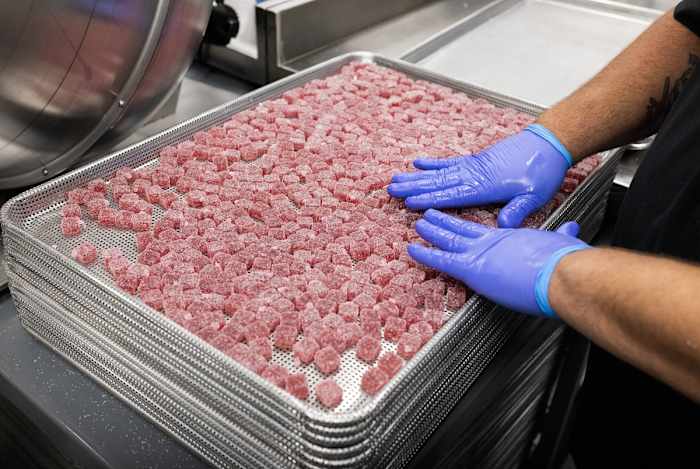[[{“value”:”
Sign up for The Brief, The Texas Tribune’s daily newsletter that keeps readers up to speed on the most essential Texas news.
Recommended Videos
The Texas House advanced a bill Monday that would expand the conditions eligible for the state’s medical marijuana program, including chronic pain and Crohn’s disease, and allow for prescribed smokable products to be sold by prescription.
House Bill 46 by Rep. Ken King, R-Canadian, would allow patients in the state’s medical marijuana program to use products like cannabis patches, lotions, and prescribed inhalers and vaping devices. The House preliminarily approved the bill 118 to 16 on Monday and will need a final round of approval before it heads to the Senate.
If it becomes law, the list of qualifying conditions would also expand to include chronic pain, traumatic brain injury, Crohn’s disease, and degenerative disc disease. The bill would also let licensed dispensers open more satellite locations, which supporters say is necessary to prevent the industry from crumbling.
“There are too many Texans who are still struggling to get access to the medicine they legally have a right to receive,” King said, pointing out his bill would allow for additional dispensing locations outside of Central Texas, where all dispensaries are currently concentrated.
Rep. Penny Morales Shaw, D-Houston, said rural Texans would have more access.
“Too many of our fellow Texans are forced to either suffer or self medicate because they don’t have sufficient access, and this is an amazing alternative to addictive, harmful opioids, which we know is a huge problem,” she said.
In Texas, licensed medical cannabis providers must house all operations, including cannabis cultivation, processing, extracting, manufacturing, testing, and dispensing, under one roof.
State regulations also prohibit inventory storage of medical cannabis products in multiple locations, so products must be distributed from the central dispensary. Any prescriptions scheduled for pickup outside the central dispensary must be driven daily to and from the pickup location—sometimes thousands of miles round-trip.
“This method puts wear and tear on our vehicles. Limits the amount of time we can spend with patients and can compromise product integrity,” said Terrence Baugh, marketing manager for goodblend, Austin-based medical marijuana producer. “We might drive 200 miles, and the person we are delivering to might not even be there at the moment.”
This has made their products more expensive and limited where the medical marijuana program can reach, hampering the small medical cannabis market in Texas.
“We also don’t have enough doctors in the program, and not enough people prescribing for it, and most patients find us through a doctor. We are dealing with several different challenges, but we are hopeful these bills might help,” said Baugh.
House Bill 46 is meant to correct some of this problem by allowing medical marijuana distributors to store their products in various satellite locations instead of having to drive across the state to return the product every day.
However, the most significant potential change would be allowing smokable marijuana products, such as vapes, to be introduced into the program, helping to match the popularity of products found in the hemp industry. The Texas medical program can currently only sell gummies, lozenges, topicals, beverages, and tinctures, as smoking or vaping products have not been approved.
Many hemp products, which are unregulated and sold more freely in smoke shops, also give the same high as medical marijuana, but are cheaper for consumers, and don’t require a visit to a medical professional for pre-approval to purchase. This ease of access has pretty much made the medical marijuana program irrelevant, according to the medical marijuana industry.
Dillan Dabelsutt, senior manager of cultivation at goodblend, said the only difference between hemp and medical marijuana is that hemp is harvested earlier.
“Hemp is just a little more flexible while marijuana is produced for high THC alone,” he said.
By allowing smokeables and expanding the conditions, the medical marijuana producers are hoping this will open the market up to more patients and increase the demand for products.
Texas lawmakers are also determining the future of hemp this session, as a House panel approved last month a bill, also authored by King, to tighten regulations on Texas’ consumable hemp industry, setting up a potential clash with Lt. Gov. Dan Patrick and the Senate, who are pursuing a total ban on THC products.
“I think we can co-exist with hemp. We just want an even playing field,” said Baugh. “I believe additional regulations are needed on hemp, and we need to loosen some on medical marijuana.”
King noted on Monday that HB 46 would have no effect on hemp and that the future of that industry will be decided another day.
“The other bill will be coming to a House floor near you,” he told lawmakers.
Texans seeking help for substance use can call the Substance Abuse and Mental Health Services Administration’s free help line at 800-662-4357. They can also access services in their region through the Texas Health and Human Services website.
First round of TribFest speakers announced! Pulitzer Prize-winning columnist Maureen Dowd; U.S. Rep. Tony Gonzales, R-San Antonio; Fort Worth Mayor Mattie Parker; U.S. Sen. Adam Schiff, D-California; and U.S. Rep. Jasmine Crockett, D-Dallas are taking the stage Nov. 13–15 in Austin. Get your tickets today!
“}]] House Bill 46 would increase the number of health conditions eligible and would offer smokeable products under the state’s medical marijuana program. Read More


